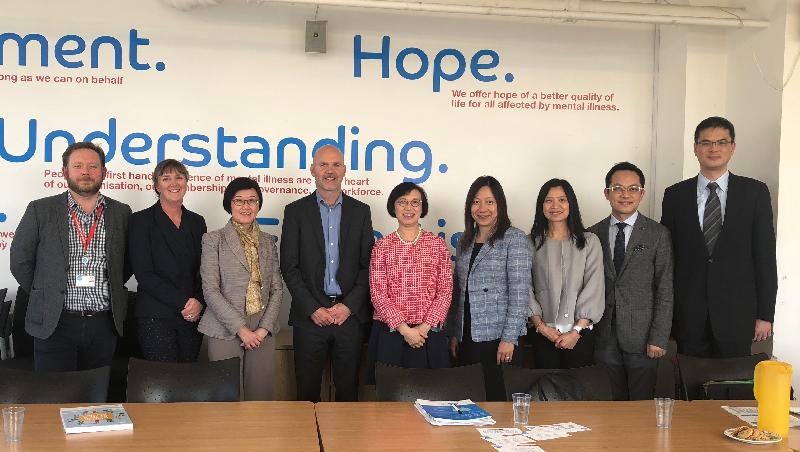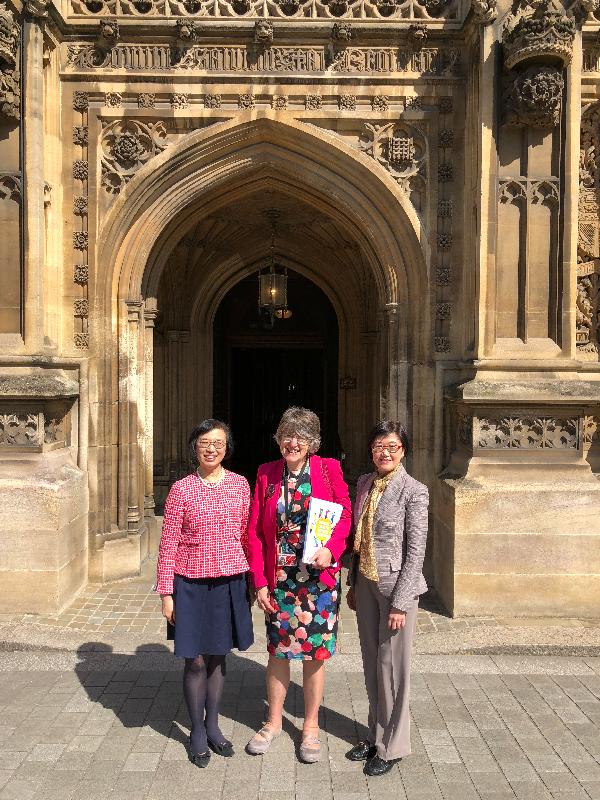Following are the speaking points delivered by the Secretary for Food and Health, Professor Sophia Chan, at the round table discussion at Chatham House in London, the United Kingdom, today (May 18, London time):
Good afternoon, friends, ladies and gentlemen.
It gives me great pleasure to have the opportunity to share with you Hong Kong’s experience in handling public health challenges, in particular in addressing the healthcare needs of the ageing population and prevention of non-communicable diseases, or NCDs in short.
A healthcare system of high quality and efficiency is the cornerstone of social development. Over the years, Hong Kong has developed a healthcare system that provides quality services for the community. We have made outstanding achievements on healthcare, and healthcare professions have upheld high professional and ethical standards. Our health indicators such as life expectancy and infant mortality rank among the best in the world. As our people live longer lives, the proportion of population aged 65 and over is projected to increase continuously, from 17 per cent in 2016 to 37 per cent in 2066.
Public Healthcare Services for Elderly
Hospital Authority
The Hong Kong Special Administrative Region (SAR) Government has implemented a heavily subsidised public healthcare system to ensure that no resident is deprived of basic healthcare due to lack of means. With an all-inclusive daily in-patient charge of only HK$120, which is roughly GBP11, for acute beds at our public hospitals, the Government is currently paying for over 90 per cent of the recurrent costs of the Hospital Authority (HA), a statutory non-government public body.
In the past, recurrent provision to the HA was considered on an annual basis, and there was no guarantee that the same amount would continue to be given in the following year. To enable the HA to address increasing service demands arising from a growing and ageing population in a more effective and sustained manner, we have just introduced a new arrangement by increasing the recurrent funding for the HA progressively on a triennium basis, having regard to population growth rates and demographic changes. In 2018-19, an additional recurrent funding of nearly HK$6 billion (or GBP560 million) (making the total HK$61.5 billion (GBP5.8 billion), an increase of 10.7 per cent from the previous year) will be allocated to the HA to increase the number of hospital beds, operating theatre sessions, the quota for general out-patient and specialist out-patient services and the manpower required.
On infrastructure support, the Government has been stepping up its commitment. In 2016, we launched the first ever 10-year hospital development plan. HK$200 billion (GBP18. 8 billion) was set aside to construct, redevelop or expand 12 hospitals, and construct three new Community Health Centres and a new supporting services centre. It will deliver around 5 000 additional hospital bed spaces, 90 additional operating theatres and 3.23 million out-patient attendances.
In the light of an increasing demand for healthcare services, we have recently invited the HA to start planning the second 10-year hospital development plan, which is expected to deliver 3 000 to 4 000 additional hospital beds and provide additional facilities and quotas for consultation. We have set aside a sum of HK$300 billion (GBP28.2 billion) as an initial provision to support the second 10-year hospital development plan, improve the clinic facilities of the Department of Health (DH), as well as upgrade and increase healthcare teaching facilities in the universities.
On the elderly care front, elderly patients account for half of all patient days and Accident and Emergency admissions, as well as more than one-third of all general out-patient clinic and specialist out-patient clinic attendances provided by the HA. Going forward, the HA will enhance healthcare services for the elderly to meet the growing service demand. This includes enhancing support for elderly patients with fragility fractures by increasing the HA’s operating theatre sessions for surgery and traumatology, and setting up geriatric fragility fracture co-ordination services in designated acute hospitals, and enhancing physiotherapy service for elderly patients.
Meanwhile, medical-social collaboration through the joint efforts of the HA and the Social Welfare Department will also be strengthened with a view to providing a full range of transitional care service and the required assistance for those elderly persons discharged from public hospitals, enabling them to age at home after the transitional period.
Department of Health
Currently, the majority of elders can receive healthcare in primary care settings. The Elderly Health Centres of the Department of Health were set up to address the multiple health needs of our senior population aged 65 or above to identify health risks and detect diseases earlier for timely intervention and prevention of complications. Integrated primary healthcare services including preventive, promotive and curative services, are provided from a family medicine perspective based on a multi-disciplinary team approach.
Besides, the Visiting Health Teams of the Elderly Health Service are engaged in reaching out to the community to deliver health promotion programmes to increase the health awareness of the elderly and their self-care ability. Using the train-the-trainer approach, the Visiting Health Teams provide outreach on-site training to sharpen the knowledge and skills of formal and family caregivers of the elderly in different care settings, including elderly homes and day care centres. With dementia becoming prevalent among elders, the Elderly Health Service has also stepped up its efforts in enhancing awareness and equipping carers with skills in taking care of demented patients.
Oral health is also a thorny issue in the elderly population. In our 2011 Oral Health Survey, compared with the situation for other age groups, the tooth loss conditions of our elderly were less satisfactory. We have experimented new models of promoting public dental services to the target groups through collaboration with the private dental sector.
In 2011, we launched a three-year pilot project to provide free basic dental care for elders in residential care homes or day care centres through subventing outreach dental teams set up by non-governmental organisations. The pilot project was converted into a regular programme namely, Outreach Dental Care Programme for the Elderly, in October 2014 with an expanded scope of treatments to cover fillings, extractions, dentures, etc, and expanded pool of beneficiaries to cover elders residing in similar facilities.
Another move is the Community Care Fund Elderly Dental Assistance Programme launched in September 2012 to provide free removable dentures and related dental services for low-income elders who are users of the home care service or home help service schemes subvented by the Social Welfare Department. The programme was expanded in phases in September 2015, October 2016 and July 2017 to cover elders who are Old Age Living Allowance recipients aged 80 or above, 75 or above and 70 or above respectively. It is encouraging to see that we have so far enlisted the participation of over 500 private dentists and 65 dental clinics operated by non-governmental organisations to provide dental services for the eligible elders.
Healthcare Manpower
The success of our healthcare system, no doubt, hinges largely on our body of dedicated, well-trained and highly professional healthcare teams.
To plan ahead, we completed a five-year-long territory-wide Strategic Review on Healthcare Manpower Planning and Professional Development in June 2017. The Strategic Review covers manpower planning as well as professional development and regulation for healthcare professions including all 13 healthcare professions subject to statutory registration.
Over the past 10 years, the Government has substantially increased the number of University Grants Committee-funded healthcare training places by about 60 per cent (from about 1 150 to about 1 800). The Government is discussing with the University Grants Committee to further increase the number of publicly funded healthcare training places for doctors, dentists, nurses and relevant allied health professionals in the 2019/20 to 2021/22 triennium.
At the same time, we count on the more flexible self-financing sector to provide training to help meet part of the increasing demand for healthcare professionals and continue to subsidise school fees for students studying in qualified self-financing healthcare training programmes.
Following the recommendation of the Strategic Review, we will update the manpower projection once every three years and have just started a new round of exercise earlier this year to update the demand and supply of healthcare manpower in Hong Kong, with results to be available in early 2020.
In order to attract more qualified doctors to come to practice in Hong Kong, we have introduced legislative amendments to the Medical Registration Ordinance to extend the validity period and renewal period of limited registration for doctors from not exceeding one year to not exceeding three years. This can provide more flexibility for the HA and the DH to recruit doctors through limited registration. The HA and the DH will proactively recruit qualified non-locally trained doctors through limited registration to alleviate the imminent manpower shortage. This is also one of the aims of my visit. I will meet some medical students studying in the United Kingdom later today and encourage them to consider returning or coming to practise in Hong Kong after graduation.
Voluntary Health Insurance Scheme
For years, we have prided ourselves over Hong Kong’s efficient, dual-track healthcare system comprising both public and private sectors. While our public healthcare system is equitable and affordable, an adaptive and vibrant private sector provides more personalised and accessible services to those who are willing and can afford to make use of it. The Government is taking forward various initiatives to enhance the development of both the public and private healthcare sectors. For instance, we have soft-launched the Voluntary Health Insurance Scheme in March this year. Insurers joining the scheme will have to comply with the Minimum Requirements prescribed by the Government in marketing and effecting hospital indemnity insurance products. By improving quality and transparency of hospital insurance, we expect that consumers will have more confidence in purchasing insurance for the use of private hospital services when needed.
Elderly Health Care Voucher Scheme
Ageing definitely presents us with challenges and we cannot be complacent with the existing provision. In recent years, instead of solely relying on the public healthcare sector, the Government has spared no efforts in looking for creative, viable and sustainable solutions to improve the quality of care for the elderly population.
One distinguished example is the Elderly Health Care Voucher (EHCV) Scheme. The Scheme aims to provide eligible elders a choice to use private healthcare services that best suit their needs, enhance primary care services, and help supplement the existing public healthcare services (e.g. General Outpatient services by the HA). Under the Scheme, eligible elders aged 65 or above are given an annual voucher amount of HK$2,000 (GBP188), with an accumulation limit to be raised to HK$5,000 (GBP470) next month, to spend on private primary care services, including preventive, curative and rehabilitative services. Since late 2015, elders can also use EHCVs to meet the fees for out-patient services provided by the University of Hong Kong-Shenzhen Hospital, which is located in Shenzhen. This is our first service point outside Hong Kong with the aim of facilitating Hong Kong elders who reside regularly in or near Shenzhen to seek medical outpatient treatments locally. As of end-April 2018, over 1 million elders, which is around 84 per cent of the eligible population, have made use of EHCVs for healthcare services. The cumulative expenditure by the Government to finance the Scheme stands at over HK$5.6 billion (GBP527 million).
Dementia Community Support Scheme
Besides, the Food and Health Bureau, in collaboration with the HA and the Social Welfare Department, has taken forward a two-year pilot scheme called the Dementia Community Support Scheme, which aims to provide support services for elderly persons with mild or moderate dementia at District Elderly Community Centres through a “medical-social collaboration” model. Since its launching in February 2017, the Scheme has been well received by the patients, carers and the healthcare and social service professionals involved. To this end, the Government will regularise the Scheme and expand it to all District Elderly Community Centres in Hong Kong.
Research – Quality of Healthcare for the Ageing
Given the ageing population and prevalence of chronic and complex diseases, the Government has been putting elderly care and service at the top of the policy agenda. To enhance the quality of healthcare services for the elderly, in 2015, the Government commissioned the Chinese University of Hong Kong to conduct a three-year research study on the quality of healthcare for the ageing. The study will inform policy in response to the challenge of the ageing population in healthcare, which includes healthcare services supporting elderly people with chronic diseases and quality of end-of-life care. The Government will study the findings and recommendations of the report when it is available, and consider carefully the next step forward on the provision of healthcare services for the elderly. In the meantime, the Hospital Authority, being the major public palliative care service provider, has formulated the Strategic Service Framework for Palliative Care to guide the development of palliative care service in the coming five to 10 years. Besides, as pledged in the Chief Executive’s Policy Address 2017, we will consider amending the relevant legislation to give patients the choice of “dying in place”.
Non-Communicable Diseases
On the other hand, driven by population ageing, changes in social fabrics and behavioural patterns, and globalisation, there is increased prevalence of unhealthy lifestyle practices. Hong Kong is thus facing an unprecedented threat from NCDs. NCDs are major causes of ill health, disability and death. In 2016, the major NCDs, namely cardiovascular diseases including heart diseases and stroke, cancers, diabetes and chronic respiratory diseases, accounted for about 55 per cent of all registered deaths in Hong Kong. In the same year, NCDs caused about 104 600 potential years of life lost before the age of 70. The health conditions of individuals also have a bearing on families, healthcare systems, and the entire society and economy as a whole.
The Hong Kong SAR Government is committed to protecting population health and reducing the burden of NCDs. As prevention and control of NCDs require the combined and sustained efforts of the Government, the community and individuals, the Government launched in 2008 “Promoting Health in Hong Kong: A Strategic Framework for Prevention and Control of Non-communicable Diseases” to guide and give impetus to the efforts. A high-level multi-disciplinary and inter-sectoral Steering Committee on Prevention and Control of Non-communicable Diseases, under the chairmanship of the Secretary for Food and Health, me and former, was set up at the same time to oversee the overall roadmap to combat NCDs. These paved the way for launching various action plans subsequently to promote a healthy diet and physical activity participation, reduce alcohol-related harm and strengthen injury prevention in Hong Kong.
As you can see, we have taken actions and devoted substantial amounts of resources on the prevention and control of NCDs over the past decade. On the positive side, I am pleased to see that, overall, the risk of premature mortality from cardiovascular diseases, cancers, diabetes and chronic respiratory diseases has been steadily decreasing over the past three decades. Yet, we remain concerned about the risk factors for NCDs taking a toll on our general population.
The Population Health Survey 2014/15 conducted by the DH showed that, for those aged 15 to 84, the prevalence of hypertension, diabetes mellitus and high blood cholesterol were significant and were as high as some 28 per cent, 8 per cent, and 50 per cent respectively. We are also seeing the famous “Rule of Half”, i.e. for every person known to be suffering from any of these conditions, at least one other person with the disease went undiagnosed and untreated. The fact that half (50.0 per cent) of Hong Kong people aged 15 to 84 are overweight or obese would make the situation worse as being overweight and obesity are significant risk factors for development of NCDs, including cancers. The Survey also revealed that in the past 12 months, some 95 per cent of the Hong Kong people aged 15 or above consumed less than five servings of fruit and vegetables a day as recommended by the World Health Organization (WHO); 13.0 per cent did not have adequate level of physical activity to be of benefit to health; and some 61 per cent had consumed alcohol, a proven cancer-causing agent for over 200 disease and injury conditions. This represents an alarming 84.4 per cent increase in regular or occasional drinkers, when compared with the findings of our first Survey conducted 10 years ago. Moreover, we found that alcohol drinking is common among young people, with 30.5 per cent of the people aged 15 to 17 being regular or social drinkers in the past 12 months. Apart from the above, the Thematic Household Survey conducted by our Government showed that 10 per cent of Hong Kong people aged 15 years or above had a daily cigarette smoking habit. If these modifiable behavioural and biomedical risk factors are left uncontrolled, we can expect significant health, social and economic consequences for our population and society.
As a member of the public health arena, Hong Kong is grateful for WHO guidance in our work in the fight against NCDs. For instance, just to name a few, the WHO’s “Global Action Plan for the Prevention and Control of NCDs 2013-2020”, “Tackling NCDs: ‘best buys’ and other recommended interventions for the prevention and control of non-communicable diseases” and “Report of the Commission on Ending Childhood Obesity” provide a road map and a menu of policy options for Governments to work systematically and collectively to reduce the NCD burden. To echo the WHO’s call for developing a multi-sectoral action plan including nine time-bound targets to combat the threat of NCDs, I am pleased to share with you that the Hong Kong SAR Government has recently launched (on May 4, 2018) a new strategy and action plan entitled “Towards 2025: Strategy and Action Plan to Prevent and Control Non-communicable Diseases in Hong Kong” (SAP), with a view to reducing the burden of NCDs, including disability and premature death, in Hong Kong by 2025. It sets out an armoury of overarching principles, approaches and strategic directions in line with the WHO’s recommendations, and provides us new impetus for stronger partnerships and closer collaborations for the good of the community and our future generations. It is a product of collaboration among stakeholders from different sectors in society.
Aligning with the WHO’s Global Action Plan, the SAP in Hong Kong will focus on four NCDs (namely cancers, cardiovascular diseases, diabetes and chronic respiratory diseases) and four shared behavioural risk factors (namely unhealthy diet, physical inactivity, tobacco use and harmful use of alcohol) that are potentially preventable or modifiable. Without any effective and timely intervention, these NCDs would have a significant impact on population health.
The SAP sets out nine local targets to be achieved by 2025, with “a 25 per cent relative reduction in risk of premature mortality from cardiovascular diseases, cancers, diabetes or chronic respiratory diseases by 2025” being the ultimate target. The other eight targets aim to achieve reduction in binge drinking and harmful use of alcohol as well as daily intake of salt or sodium and tobacco use. We shall also aim to encourage more physical activity and contain the prevalence of raised blood pressure, diabetes and obesity, prevent heart attacks and strokes through drug therapy and counselling, and improve the availability of affordable basic technologies and essential medicines to treat NCDs. To reach our targets, new strategic directions will be adopted to accelerate actions on the NCD reduction agenda. The Hong Kong SAR Government will demonstrate leadership in many ways, such as by transforming schools into healthy settings for students’ development, creating supportive physical and social environments for physical activity, fostering effective partnerships with primary care professionals, and keeping in view accumulating evidence and overseas experience on interventions recommended by the WHO. All in all, our overall objective is to promote healthy life through less alcohol, less salt and sugar, less tobacco and more exercise.
The SAP has put forward a sustained and systematic portfolio of initiatives to introduce interventions throughout the course of life to help prevent occurrence and progress of NCDs, thereby addressing the NCD burden. These include:
(a) strengthening NCD surveillance by enhancing the existing surveys and information collection to keep track of population-based NCD status and key behavioural and biomedical risks;
(b) carrying out alcohol screening and brief interventions, including to strengthen treatment services for people with alcohol problems and support people who want to cut down or stop drinking alongside stepped up education;
(c) promoting physical activity participation in schools and society by collaborating with the education sector and other sectors with enhanced opportunities and accessibility to physical activity;
(d) continuing discussion with the trade on product reformulation to reduce salt in food alongside ongoing efforts to implement various salt reduction schemes and dialogue with the catering industry to supply a greater variety of food with less salt;
(e) adopting a multi-pronged approach in tobacco control including the expansion of statutory no-smoking areas, strengthening the regulatory regime on e-cigarettes and heat-not-burn tobacco products and the implementation of a smoking cessation public-private partnership programme; and
(f) strengthening the health system at all levels, in particular comprehensive primary care for prevention, early detection and management of NCDs based on the family doctor model.
Meanwhile, the SAP will adopt a set of 34 local NCD indicators including 25 key indicators derived from the WHO’s global monitoring framework (such as cancer incidence and mortality; prevalence of binge drinking among adolescents; and the detection rate of being overweight and obesity in primary and secondary students) and nine supplementary indicators of local relevance (such as prevalence of daily cigarette smoking among persons aged 15 years and above, and the breastfeeding rate on discharge from hospitals) to monitor the plan’s effectiveness.
Although Hong Kong enjoys the status of one of the economies with the longest life expectancy, we must not be complacent since we know there are real challenges in achieving healthy ageing. To this end, my bureau, the DH and the Steering Committee are committed to taking a leading role in implementing the agenda. Moreover, to take our goal to a heightened horizon, the health sector must work in concerted efforts with all sectors in the community. We will continue to foster co-operation across sectors and work in close partnership with the community and members of the public to build a health-enhancing physical and social environment to promote health of all Hong Kong people. We will also closely monitor, review progress of implementation and communicate our achievement of the stated actions with members of the community. We must also keep in view global, regional and local developments and emerging evidence of strategies in light of changing social and environmental circumstances. We noticed that the UK’s recent introduction of sugar tax to curb sugar consumption is a bold step forward which has enlightened us.
With systematic implementation of the SAP, we look forward to seeing a happier and healthier population as we move towards 2025. In health promotion and disease control, we are one world. Let us all work together hand in hand to help build a healthier and suitable world for us and our next generations.
Conclusion
Let me conclude by reiterating our commitment to build communities that enable our citizens to stay healthy, as well as to enable our elderly citizens to remain active and connected with the society.
Thank you once again Chatham House for organising this meaningful event this afternoon.
read more






